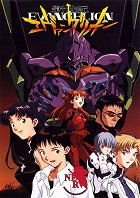Photographie:
Yôichi KurodaMusique:
Shirō SagisuActeurs·trices:
Megumi Hayashibara, Megumi Ogata, Kotono Mitsuishi, Yuuko Miyamura, Kōichi Yamadera, Takehito Koyasu, Tomokazu Seki, Akiko Yajima, Akira Ishida (plus)VOD (1)
Épisodes(26)
-
L'Attaque de l'ange (E01)
-
Plafonds inconnus (E02)
-
Le Téléphone ne sonnera pas (E03)
-
La Pluie, après la fugue (E04)
-
Rei, par delà son cœur (E05)
-
Combat décisif à Tokyo (E06)
-
Construit par l'homme (E07)
-
L'Arrivée d'Asuka au Japon (E08)
-
Juste un instant, les cœurs, à l'unisson (E09)
-
Magmadiver (E10)
-
Dans les ténèbres immobiles (E11)
-
De la valeur d’un miracle (E12)
-
L'Ange, la pénétration (E13)
-
Seele, trône de l’âme (E14)
-
Mensonges et silence (E15)
-
La Désespérance, et après… (E16)
-
Le Quatrième Qualifié (E17)
-
Le Droit de vie ou de mort (E18)
-
La Guerre d'un homme (E19)
-
Forme du cœur, miroir des gens (E20)
-
Nerv, la naissance (E21)
-
Humain, au moins d'aspect (E22)
-
Larmes (E23)
-
Le Dernier Messager (E24)
-
Un monde s'achève (E25)
-
La Bête qui criait « moi » au centre du monde (E26)
Critiques (2)
"Man isn´t a god, after all." A timeless classic and one of the flagships of anime even in/for the West. As much as it may seem at first glance to be a Japanese kaiju variation on the book “Ender's Game”, only about kids piloting giant bio-robots bouncing malevolent crap out of space, it's not. Oedipus complex, moral grey areas, coming of age, biblical themes, individual/human roles/responsibilities, playing God, metaphysics, depression studies... And many other big themes, but handled through symbolism, sophisticatedly and, like many other aspects, timelessly and loosely enough to be interpreted that even more than a quarter century after its release, the conclusion still evokes emotion and "what, how, who, why" conjecture. Moreover, it's a series that gets better and more fateful the closer it gets to the finish line. And the beginning is not bad; quite the opposite. It's not a repetitive shonen where the protagonists' and antagonists' abilities grow exponentially and the finale is in sight after hundreds of episodes. Here, the end is inevitable and the series evolves; it doesn't feature one monster in every episode. This results in the fact that not all episodes will suit everyone equally. I'm no exception to this; specially around the middle I have a few unpopular episodes. However, these are not filler episodes, beating up empty straws or bloating the running time. It's purely a clash of the approach taken and my taste. After all, genre-wise it's unanchored; from teen comedy to post-apocalyptic sci-fi to existential horror. That's why I rate the series (or actually the series and the final feature-length special, as they are inseparable) as a whole. There are still a few issues, for example, the typically 90's Japanese over-sexualization of 14 year old girls is downright cringe and definitely not timeless. It was already cringeworthy at the time of its release, much less today. And the penguin, who was probably supposed to be a cute mascot for the show, but is completely out of number and out of power. On the other hand, the (semi-)angelic EVA colossi have become the symbol of the series and of an entire era. After all, it is the representation of (not only their) scale that the series has not the slightest problem with. More than one scene is worthy of framing.
()
A miracle from the nineties that would never work today. Not so much because of a decline in interest in giant robots, but purely because it's a thing unto itself. As a result, it has the most variable moods I have ever seen in an anime. I enjoy both the mischievous and provocative fan service in the opening credits and the constant adolescent squealing, as well as the historically accurate liveliness. As long as Evangelion is just a youthful mecha action interspersed with catchphrases or naive episodic clichés (whether the heroes go to school, on vacation, or literally anywhere, they will always have to fight an Angel), it is more than decent entertainment that lets itself be watched. After the transition to a more serious level, which gradually escalates into demanding psychology or thriller, the series definitively earns its reputation as an unforgettable and above all unique creator of a subgenre. This leap from eternal smiles and self-deprecation naturally has a greater impact on the viewer, from episode to episode. At that moment, the script is not afraid to retreat from the expectation of the greatest action inferno into a mysterious detective story or introspection of the main character, and it only reluctantly reveals similar dilemmas until the very end. The climax probably took everyone's breath away at the time, and even though I was prepared for it, the constant chaotic ramblings and mental self-harm still overwhelmed me. However I imagined the ending (whether in the series or in the movies), Shinji, Rei, and Asuka will always remain a unique memory.
()

